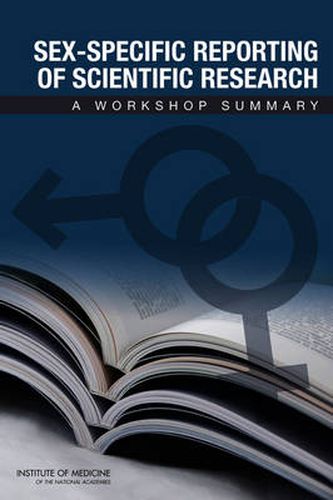Sex-Specific Reporting of Scientific Research: A Workshop Summary
Institute of Medicine

Sex-Specific Reporting of Scientific Research: A Workshop Summary
Institute of Medicine
The number of women participating in clinical trials has increased during the last two decades, but women are still underrepresented in clinical trials in general. Some of the overall increase can be attributed to the greater number of women-only trials (of therapies for diseases that affect only women). Even when women are included in clinical trials, the results are often not analyzed separately by sex. On August 30, 2011, the Institute of Medicine (IOM) Board on Population Health and Public Health Practice hosted the workshop Sex-Specific Reporting of Scientific Research. The workshop explored the need for sex-specific reporting of scientific results; potential barriers and unintended consequences of sex-specific reporting of scientific results; experiences of journals that have implemented sex-specific requirements, including the challenges and benefits of such editorial policies; and steps to facilitate the reporting of sex-specific results. Presenters and participants included current and former editors of scientific journals, researchers, and scientists and policymakers from government, industry, and nonprofit organizations. Presentations and discussions highlighted the importance to both women and men of having sex-specific data, the problems with sample size and financial constraints for conducting the research, the appropriateness of sex-specific analyses, and the limitations of journal policies to change experimental designs. Sex-Specific Reporting of Scientific Research summarizes the presentations and discussions by the expert panelists during the IOM workshop. The workshop’s first session focused on why sex-specific reporting is important. Panelists highlighted historical and current events that have hindered or helped to advance the study of women. In the next session, panelists in academe discussed the challenges of collecting, analyzing, and reporting sex-specific data from the researcher’s perspective. That was followed by two panels of leading journal editors who shared their experiences in developing and implementing editorial policies and the implications of sex-specific reporting policies for journals. –Publisher’s description.
This item is not currently in-stock. It can be ordered online and is expected to ship in approx 4 weeks
Our stock data is updated periodically, and availability may change throughout the day for in-demand items. Please call the relevant shop for the most current stock information. Prices are subject to change without notice.
Sign in or become a Readings Member to add this title to a wishlist.


